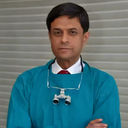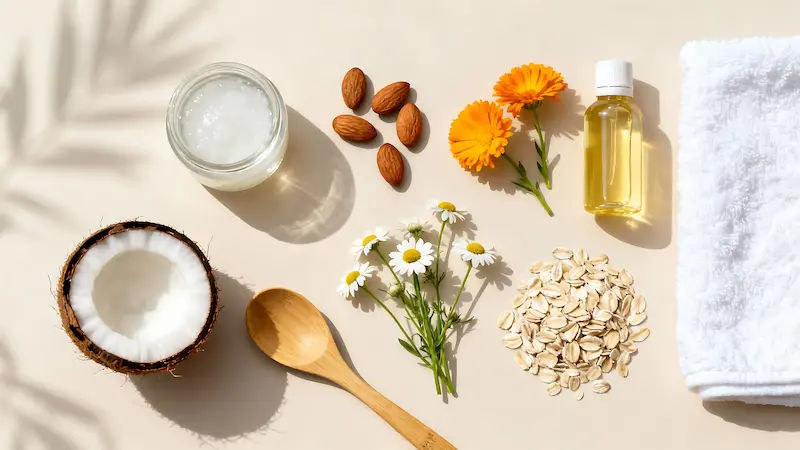Dentist Approved Tips for a Healthy Mouth
Discover dentist-approved tips for a healthy mouth, including daily care routines, diet advice, and preventive practices to maintain strong teeth and gums.

Written by Dr. D Bhanu Prakash
Reviewed by Dr. Dhankecha Mayank Dineshbhai MBBS
Last updated on 13th Jan, 2026

Introduction
A healthy mouth is the cornerstone of overall well-being, far exceeding the value of a camera-ready smile. It’s about confidence, comfort, and crucially, your body’s health. Yet, many of us stick to a basic routine without understanding the "why" behind it. This guide moves beyond just "brush and floss" to provide a comprehensive, actionable blueprint for achieving and maintaining optimal oral health. We will delve into the perfect brushing technique, explore the undeniable link between your gums and your heart, and uncover the dietary choices that can make or break your dental health. Whether you're looking to correct long-standing habits or simply optimise your routine, these dentist-approved tips will empower you to take control of your oral health and, by extension, your overall wellness. Let's transform your approach to oral hygiene and build a foundation for a truly healthy mouth.
Why a Healthy Mouth is More Than Just a Pretty Smile
We often associate a healthy mouth with a bright, white smile. While aesthetics are important, the benefits run much deeper, impacting your entire body.
The Oral-Systemic Link: Your Mouth as a Health Window
Your mouth is not an isolated ecosystem. It’s a gateway, and the bacteria within it can enter your bloodstream and travel throughout your body. Extensive research has established a strong oral-systemic link. For instance, the chronic inflammation associated with gum disease (periodontitis) is linked to more severe health complications, including:
- Cardiovascular Disease: Inflammation in the gums may increase inflammation in the blood vessels, raising the risk of heart attack and stroke.
- Diabetes: Periodontal disease can make blood sugar harder to control, and diabetes can make you more susceptible to gum infections, a two-way street.
- Respiratory Infections: Inhaling bacteria from infected teeth and gums can lead to pneumonia, especially in older adults.
- Pregnancy Complications: Gum disease has been linked to preterm birth and low birth weight.
Preventing Painful and Costly Problems
Ignoring your oral health is a gamble with high stakes. A simple, preventable cavity can escalate into a root canal or even a tooth extraction. Early-stage gingivitis (gum inflammation) is reversible with good care, but advanced periodontitis can lead to permanent bone loss and tooth loss. Preventative dentistry through a solid home routine and regular check-ups is infinitely less painful, less stressful, and more cost-effective than emergency treatments down the line.
Consult a Dentist for the best advice
The Daily Non-Negotiables: Your Foundation for Oral Health
A strong daily routine is your first and most important line of defense. It’s not just about doing it; it's about doing it right.
Brushing: Technique Trumps Everything
- Brushing twice a day for two minutes is the golden rule, but technique is everything. Aggressive scrubbing can damage enamel and irritate gums.
- Angle: Hold your brush at a 45-degree angle to your gums.
- Motion: Use gentle, short, circular or back-and-forth strokes, not broad, harsh sawing motions.
- Coverage: Brush all surfaces: outer, inner, and chewing surfaces. Don’t forget your tongue to remove bacteria and freshen breath.
- Timing: Wait at least 30 minutes after eating, especially if you consumed something acidic, to avoid brushing acid into your enamel.
Choosing the Right Toothbrush and Toothpaste
A soft-bristled brush is ideal for most people, as it effectively cleans without causing damage. Whether you choose manual or electric is a matter of preference; electric brushes can be more effective for those with dexterity issues. For toothpaste, the American Dental Association (ADA) Seal of Acceptance is your guarantee that it contains fluoride, a mineral essential for strengthening enamel and preventing cavities.
Flossing: The Secret Weapon You’re Probably Ignoring
Brushing alone only cleans about 60% of your tooth surfaces. Flossing is the only way to remove plaque and food debris from between teeth and under the gumline areas where cavities and gum disease often start.
Technique: Use about 18 inches of floss. Wind most around one finger and a little around the same finger on the opposite hand. Gently guide it between teeth using a zig-zag motion, curving it into a "C" shape against one tooth and sliding it under the gumline.
Alternatives to Traditional Floss
If you find string floss difficult, you’re not alone. Water flossers (oral irrigators) are an excellent and clinically proven alternative, particularly effective for those with braces, bridges, or implants. Interdental brushes are also great for cleaning larger gaps between teeth.
The Power of the Rinse: Mouthwash’s Role
Mouthwash is a helpful adjunct, not a replacement for brushing and flossing. Therapeutic mouthwashes contain ingredients like fluoride, cetylpyridinium chloride, or essential oils that can help reduce plaque, fight gingivitis, and provide fluoride. Cosmetic mouthwashes primarily freshen breath temporarily. For advice on the best type for your specific needs, such as dealing with chronic bad breath or dry mouth, consulting a dentist online with Apollo24|7 can provide personalised guidance.
Beyond the Brush: Diet and Lifestyle for a Healthy Mouth
What you eat and drink directly fuels or fights the bacteria in your mouth.
Foods That Fight Plaque (And Those That Feed It)
Sugary and starchy foods (candy, soda, bread, chips) are the primary fuel for cavity-causing bacteria. Instead, focus on:
- Crunchy Fruits and Vegetables: Apples, carrots, and celery help clean teeth and stimulate saliva.
- Calcium-Rich Foods: Cheese, milk, and yoghurt help strengthen teeth.
- Leafy Greens: Packed with vitamins and minerals that support oral health.
- Water: Especially fluoridated water.
Hydration: Water is Your Mouth’s Best Friend
Saliva is your mouth’s natural defence system, washing away food particles and neutralising acids. Drinking plenty of water throughout the day stimulates saliva production and helps prevent dry mouth, a condition that significantly increases the risk of decay.
The Impact of Smoking and Alcohol
Tobacco use in any form is one of the most significant risk factors for gum disease and oral cancer. It impairs blood flow to the gums, hindering healing. Excessive alcohol consumption dries out the mouth and is also a major risk factor for oral cancer.
Don’t Go It Alone: The Critical Role of Professional Care
Your home routine is vital, but it can’t remove tartar (hardened plaque) or diagnose problems invisible to the naked eye.
What Happens During a Check-up & Cleaning?
A professional cleaning removes plaque and tartar from above and below the gumline. The check-up allows the dentist to:
- Examine for early signs of decay, gum disease, and oral cancer.
- Take X-rays to see problems between teeth and beneath the gums.
- Provide personalised advice based on your unique oral environment.
How Often Should You Really See a Dentist?
The standard recommendation is every six months. However, your dentist may suggest more frequent visits if you have a history of gum disease or are at a higher risk for other oral health problems. If you experience bleeding gums, persistent pain, or other symptoms, booking a physical visit to a dentist is crucial for a proper diagnosis.
Conclusion
Achieving a truly healthy mouth is a lifelong commitment that blends consistent daily habits with informed lifestyle choices and regular professional partnership. It’s a holistic practice where the right brushing technique is as important as your dietary choices, and where understanding the oral-systemic link provides powerful motivation. By embracing the comprehensive tips in this guide, from mastering the art of flossing to prioritising your dental check-ups, you are not just investing in a beautiful smile. You are making a proactive investment in your long-term overall health, saving yourself from future discomfort and expense. Start today by auditing your routine, scheduling that dentist appointment you’ve been putting off, and taking one step toward a healthier, happier you.
Consult a Dentist for the best advice
Consult a Dentist for the best advice

Dr. Debarati Deb
Dentist
11 Years • BDS, MDS Oral Medicine and Radiology
Kolkata
Dr. Smile Multispeciality Dental Clinic, Kolkata

Dr. Rajeev Thaper
Dentist
40 Years • BDS
Jaipur
Thaper Dental clinic, Jaipur

Dr. Aritra Mandal
Dentist
6 Years • BDS, MDS (PERIODONTOLOGY)
Kolkata
COSMI DENTAL, Kolkata

Dr. Spandan Daschowdhury
Dentist
2 Years • BDS
Kolkata
MCR SUPER SPECIALITY POLY CLINIC & PATHOLOGY, Kolkata

Dr. Shamit Thaper
Dentist
6 Years • BDS, MDS (Periodontology)
Jaipur
Thaper dental Clinic, Jaipur
Consult a Dentist for the best advice

Dr. Debarati Deb
Dentist
11 Years • BDS, MDS Oral Medicine and Radiology
Kolkata
Dr. Smile Multispeciality Dental Clinic, Kolkata

Dr. Rajeev Thaper
Dentist
40 Years • BDS
Jaipur
Thaper Dental clinic, Jaipur

Dr. Aritra Mandal
Dentist
6 Years • BDS, MDS (PERIODONTOLOGY)
Kolkata
COSMI DENTAL, Kolkata

Dr. Spandan Daschowdhury
Dentist
2 Years • BDS
Kolkata
MCR SUPER SPECIALITY POLY CLINIC & PATHOLOGY, Kolkata

Dr. Shamit Thaper
Dentist
6 Years • BDS, MDS (Periodontology)
Jaipur
Thaper dental Clinic, Jaipur
More articles from General Medical Consultation
Frequently Asked Questions
What is the best way to improve gum health naturally?
The best natural ways to improve gum health include meticulous brushing and flossing to remove plaque, eating a vitamin-C-rich diet (e.g., citrus, bell peppers) to strengthen gum tissue, and avoiding tobacco. However, if gums are already inflamed, professional care is essential.
Is an electric toothbrush really better than a manual one?
For many people, yes. Electric toothbrushes can be more effective at reducing plaque and gingivitis because they provide consistent motion and often have timers to ensure you brush for the full two minutes. They are also excellent for those with limited dexterity.
I floss every day, but my gums still bleed. Why?
Bleeding gums are a sign of inflammation, usually caused by plaque that hasn’t been fully removed. If you’ve just started flossing, bleeding may subside after a week of consistent routine. If it persists, it could indicate gingivitis or improper technique. It's best to consult a dentist for an evaluation.
How can I tell if I have a cavity?
Early cavities may have no symptoms. As they progress, you might experience tooth sensitivity, pain when biting down, visible holes or pits in your teeth, or staining (brown, black, or white). Only a dental exam and X-ray can confirm a cavity for certain.
What causes chronic bad breath (halitosis)?
While often linked to food, persistent bad breath typically originates from bacteria on the tongue and between teeth. Other causes can include dry mouth, gum disease, tobacco use, or underlying medical conditions. Improving oral hygiene and staying hydrated are the first steps to address it.
_0.webp)



